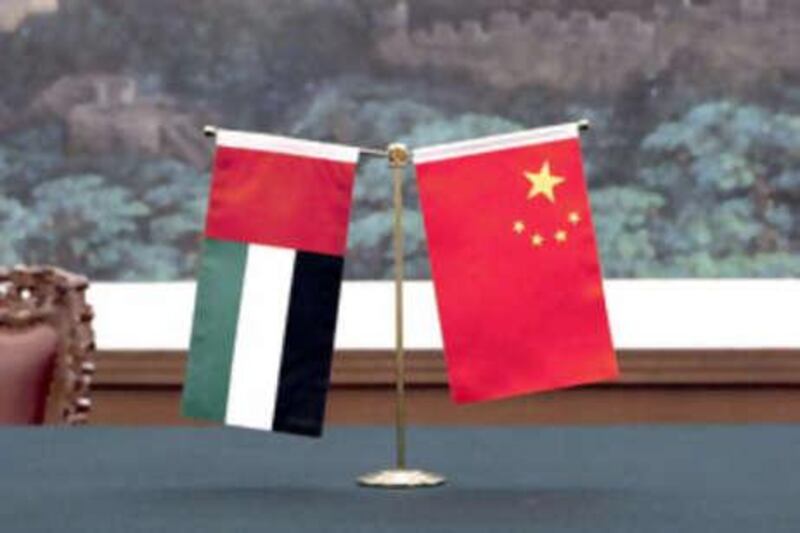When the UAE welcomed two Chinese naval ships for a port call this year - the first such visit in modern history - parallels were drawn with Admiral Zheng He's voyages to the Arabian peninsula, which heralded the rise of China's international influence in the early 1400s.
The Muslim seafarer from Yunnan province, who grew up speaking Arabic and Chinese, caused a sensation when he landed in what is today Yemen. Nineteen ambassadors from across the region travelling to board his ships with gifts for the Yongle Emperor of China. Some 600 years later, relations between China and the Arab world are on the ascent again. Rapid growth in trade in the last decade has prompted talk of a new "silk road" - land and sea routes established more than 2,000 years ago, which carried goods, culture, language, art and religion between east Asia and the Middle East.
Now, I believe, the focus will turn to increasing two-way investment to complement trade flows. With free trade talks under way between the GCC and China, trade is set to more than triple to at least US$350 billion (Dh1.28 trillion) by 2020, according to the US global consultancy McKinsey. China recently overtook the US as the biggest exporter to the GCC, with annual exports to the region growing more than tenfold to around $60bn in the last decade, as population growth and rising incomes fuelled demand.
In return, the GCC countries supply 35 per cent of China's crude oil imports, with more than half of that coming from Saudi Arabia. But as an example of how investment has so far lagged behind trade, in 2008 China accounted for only 4 per cent of foreign direct investment in Saudi Arabia, the biggest and most populous economy in the Gulf. And Middle East investors, increasingly active globally in recent years, still lie far behind Japan, South Korea, the US and Germany as sources of direct investment in China, partly because traditionally they have not been active in the manufacturing sector.
However, the landscape is changing as Chinese and Middle East investors begin to seize new opportunities. That is why Nasser Ahmed al Suwaidi, the chairman of the Abu Dhabi Department of Economic Development, and several executives from the emirate met high-level Chinese officials and institutions at the Abu Dhabi and China Investment Forum in Shanghai yesterday. Momentum is building thanks to shared interests fostered by trade, particularly in the field of energy. Last month, Borouge, partly owned by the Abu Dhabi National Oil Company, opened a plant in Shanghai to produce polypropylene compounds used for the car industry.
Saudi Aramco and Sinopec have built a $5bn oil refinery in Fujian Province and are looking at a similar project in Qingdao. And Saudi chemicals company SABIC is building a $3bn petrochemicals complex in Tianjin. But investment will thrive in more diverse areas because of the many similarities between China and the Middle East. A high degree of understanding tends to reduce the "screening costs" involved in evaluating an investment and facilitates decision making.
For example, Chinese investors can see the worth of the estimated $2.4tn infrastructure development planned and under way in the Middle East because a similar building programme had a hugely positive multiplier effect on China's economy in the past decade. Chinese construction companies are already using their vast home market experience to win contracts in the Middle East, including $2.1bn worth of deals in the UAE alone in 2008.
But a new role is also emerging for Chinese capital and Abu Dhabi companies such as Invest AD can offer co-investment opportunities, not just here but across the Middle East and Africa. The kind of venture capital opportunities that have brought private equity investors flocking to China also abound in the Middle East. And even the way business deals are done - relying on trust and long-cultivated connections, or what the Chinese call "guanxi" - is similar.
Fast-growing companies are hungry for financing to capitalise on the vibrant Middle East economy, forecast to record growth of above 4 per cent annually for the next four years. With bank lending still slow and initial public offerings on hold, this is a great opportunity for private equity investors to help ambitious businesses expand across the region in the same way as Chinese brands are now making a name in the global marketplace.
New industries to the region, such as petrochemicals, low-cost airlines and financial services, are well represented on the Middle East's equities markets. And because the UAE, Jordan and Egypt have all signed agreements with China Securities Regulatory Commission, they are among some 40 markets open to Chinese investors through the Qualified Domestic Institutional Investor scheme. As major exporters of manufactured products and hydrocarbons respectively, China and the Middle East have been running large current account surpluses and both are destined to become major investors on the international stage as the global economy rebalances.
As this happens, it is important that we widen our close relationship to include two-way capital flows as we seek diversification in our investments and, of course, the modern-day returns to match the treasures carried by Admiral Zheng He's flotillas. Nazem Fawwaz al Kudsi is the chief executive of Invest AD, an Abu Dhabi Government-owned investment company that offers private equity and listed equities funds as well as co-investment opportunities in the Middle East and Africa





